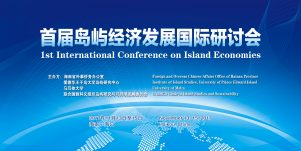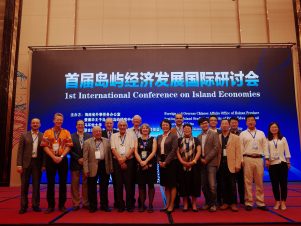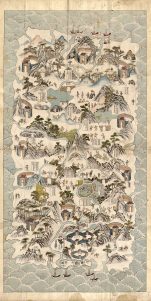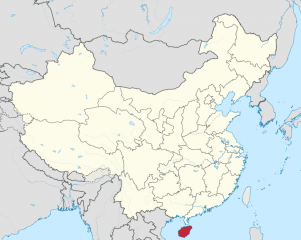1st International Conference on Island Economic Change and Development
November 14-15, 2017
Haikou, Hainan Island, P.R. of China
Co-organized by the Hainan Foreign and Overseas Chinese Affairs Office; Institute of Island Studies, University of Prince Edward Island; University of Malta; UNESCO Chair in Island Studies and Sustainability
PROGRAM | INTERNATIONAL SPEAKER BIOS | CHINESE SPEAKER BIOS
ABSTRACTS
ISLAND ECONOMIES VIDEO SERIES, featuring conference speakers
 Purpose
Purpose
The purpose of this conference was to bring a small group of well-respected international scholars to Haikou, Hainan, to speak on cutting-edge research pertaining to island economic change and development, especially as this applies to subnational island jurisdictions like Hainan. The Hainan government has shown that they are serious and committed to building knowledge and sharing that knowledge in order to better understand islands and islanders. This was reflected in the Boao Forum, held in March 2017, where global island leaders and experts were invited to talk about the challenges and accomplishments facing their islands. This conference represents another important element of this strategy to build capacity and knowledge.
However, this is not just about building internal capacity in China. With the bringing together of international and Chinese scholars in this two-day conference, there was an explicit recognition of the role that Chinese scholars can play in developing a better understanding of the issues surrounding the topic of island economic change and development. The sharing of knowledge from both sides, together with an audience of 50-60 Chinese and Hainan scholars, government staff and researchers who actively participated in this event, resulted in two days of rich dialogue, translating examples from other islands around the world into cases that may have relevance to China, and building on the intellectual capacity and international professional networks of Chinese government staff, scholars and their institutions in island studies and related fields. As a result, in coming together to discuss matters of paramount concern to ALL islanders, we built relationships, trust and friendships that will carry on long after the end of this conference.
The Hainan Statement on Island Economies: What Must Be Done
At the end of the two days, conference delegates drafted a statement that affirmed next steps. They include:
- engaging in collaborative research projects on issues related to island economies;
- working with international organizations and governments to create a global standard template for the collection of harmonized data on subnational island jurisdictions;
- ensuring that the harmonized data on subnational island jurisdictions is meaningful to the day-to-day lives of islanders, as well as to local and international researchers, governments and organizations; and
- assisting Hainan Province to conduct studies on opening up policy which is critical to its development; and monitoring the progress to meet the actions listed above.
[PDF of the Hainan Statement, in English and Mandarin]
 Themes and Sessions
Themes and Sessions
Session 1 – Conceptualizing and Evaluating Models of Island Economies: Island economies have been described by using the acronyms MIRAB (i.e., migration, remittances, aid and bureaucracy), SITE (tourism) and PROFIT (strategic flexibility) models. What are the advantages and challenges of using these kinds of models to describe and understand island economies? How do island economies evolve from one model to another and how does one plan for this transition? How do each of these models develop their own forms of sustainability?
Session 2 – Measuring (Economic) Success on Islands: Long-term sustainable success of island economies rarely depends on one activity and can rarely be measured by one indicator (e.g., Gross Domestic Product). It can be measured via a range of different metrics, including quality of life of its citizens, retention of local population and ability to attract non-locals, purchasing power, effective governance and citizen participation, low carbon footprint, a diversified economy, a powerful brand identity, the presence of entrepreneurship, and the degree of openness to external markets and ideas. This session summarizes and critically examines the ways in which we define and measure (economic) success on islands.
Session 3 – Local to Global Factors Influencing Island Economies: Island economies tend to be impacted by domestic, national and regional/international events and dynamics. How do local stakeholders – in both state and civil society – influence an island’s economic make-up, especially in light of global forces? How challenging are transitions to ‘green’ and ‘blue’ economies, and are these ‘colour’ economies truly a step forward for islands or an excuse for continued unsustainable practices dressed up in sustainable jargon.
Session 4 – Comparing the Economic Past, Present and Futures of Small Island States (SISs) and Subnational Island Jurisdictions (SNIJs): Island economies can be organised in terms of sovereign and non-sovereign jurisdictions. What are the benefits and disadvantages of being a sovereign island state today, and how do these compare to the benefits and disadvantages of being autonomous but not independent? This session will address these questions from a local (e.g., Hainan), regional (e.g., Taiwan, Macau, Hong Kong) and global scales.

A 19th-century map of Hainan Island
_____________________________________________________________



 Outcomes
Outcomes